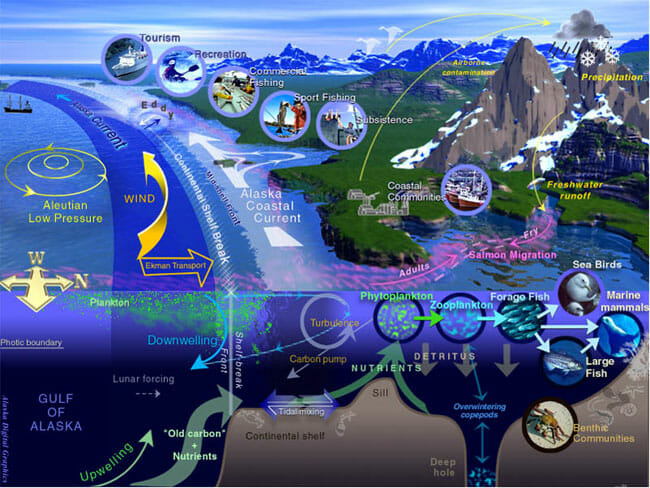Marine ecosystems include not just the oceans but also shorelines, tidepools, estuaries, barrier islands, mangrove forests, and salt marshes. Here are the top 5 facts about marine ecosystem.
The Marine Ecosystem is the Largest Ecosystem on Earth
The oceans alone cover about 70% of the Earth’s surface or 140,000,000 square miles. The average ocean depth is about 12,000 feet and the deepest point is the Mariana Trench in the Pacific Ocean with a depth of about 32,800 feet.
The Marine Ecosystem has the Greatest Biodiversity on Earth
Almost half of the known species on Earth live in marine ecosystems and scientists suspect there may be another 1 million yet to be discovered. Roughly 700,000 to 1 million species live in the oceans.
Phytoplankton in the Oceans Provide 50% to 85% of the Oxygen on Earth
Phytoplankton are tiny plants that live in the upper areas of the ocean and use photosynthesis to make their food. They are so abundant in the oceans that all together they account for about 50% of the photosynthetic activity and over 50% of the oxygen production on the planet.
Mangrove Forests are Diverse Ecosystems
Mangrove forests are found on tropical and subtropical marine coastlines and tidal areas. They contain small trees and shrubs tolerant of salt water. The root systems of the forests form tangled webs of habitat where many species of fish, invertebrates, seabirds, and waterfowl live, reproduce, and mature.
Oceans Regulate the Earth’s Climate
The oceans absorb most of the heat radiated from the sun especially around the equator. The ocean currents distribute the heat around the planet, but most of the heat is lost due to evaporation. The constantly evaporating ocean waters create rain, thunderstorms, and hurricanes by increasing the temperature and humidity of the air. Because the trade winds carry these storms over vast distances, most of the precipitation that falls on land originates in the oceans.

The image above shows the typical characteristics of the marine ecosystem in the Gulf of Alaska.
References
- Facts and figures on marine biodiversity | United Nations Educational, Scientific and Cultural Organization. (n.d.). Retrieved May 16, 2018, from http://www.unesco.org/new/en/natural-sciences/ioc-oceans/focus-areas/rio-20-ocean/blueprint-for-the-future-we-want/marine-biodiversity/facts-and-figures-on-marine-biodiversity/
- Ocean. (2018, May 15). In Wikipedia. Retrieved from https://en.wikipedia.org/w/index.php?title=Ocean&oldid=841293100
